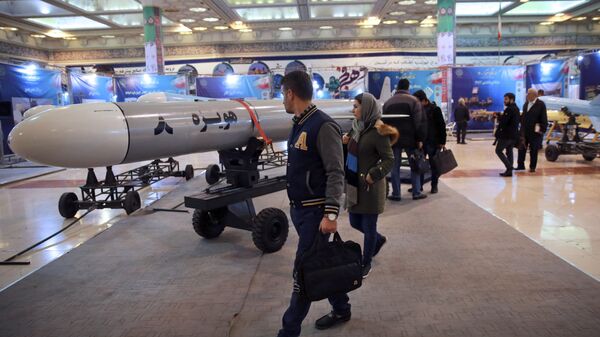Venezuelan President Nicolas Maduro has announced that it would be “good idea” to consider buying Iranian missile systems.
“It had not occurred to me, it had not occurred to us,” Maduro said during a cabinet meeting broadcast on television, before asking Defence Minister Vladimir Padrino to look into the idea.
“Padrino, what a good idea, to speak with Iran to see what short, medium, and long-range missiles they have, and if it is possible, given the great relations we have with Iran,” Maduro said.
Earlier, President Duque of Colombia accused Caracas of contemplating the purchase of Iranian-made missiles, and of transferring weapons to Colombian militant groups.
According to Duque, his concerns are based on “information from international intelligence agencies which work with us". Duque did not name the ‘international intelligence agencies’ involved, and added that no Iranian missiles have reached Venezuela’s shores to date.
Venezuelan Foreign Minister Jorge Arreaza responded to Duque’s allegations in a tweet. “In Colombia, there is no end to the massacres, the unleashed violence, the uncontrollable drug trafficking. If you add his catastrophic and unpopular management and having his boss in jail for being a paramilitary, Ivan Duque returns to anti-Venezuelan baseness and fiction to distract public opinion,” he wrote.
En Colombia no cesan las masacres, la violencia desatada, el narcotráfico incontrolable. Si le sumas su catastrófica e impopular gestión y tener a su jefe en la cárcel por paramilitar, @IvanDuque vuelve a las infamias y ficción anti venezolana para distraer a la opinión pública. https://t.co/9Sgw8FQWUT
— Jorge Arreaza M (@jaarreaza) August 20, 2020
Padrino, meanwhile, dismissed Duque’s remarks as part of a ‘false flag’ strategy aimed at sparking a crisis resembling the Cuban Missile Crisis of October 1962 “to try to create international opinion that Venezuela imports terrorism”.
Caracas and Bogota formally broke off diplomatic relations in early 2019, after Venezuelan opposition lawmaker Juan Guaido proclaimed himself Venezuela’s ‘interim president’ and demanded that Maduro step down, with Colombia recognising his claims. Tensions escalated again in May after a group of US mercenaries and Venezuelan militants in Colombia attempted to launch a seaborne assault aimed at kidnapping Maduro and taking him out of the country by plane. The plot failed, with eight mercenaries killed and several dozen others, including two US mercenaries, captured and imprisoned.
Over the past two decades, amid international restrictions on the sale of arms to Iran, Tehran has created and fielded a broad range of missiles for use against ground, aerial and naval targets, including ballistic and cruise. This week, Iran unveiled a new long-range missile with a range of nearly 1,400 km named after slain Quds Force commander Gen. Qasem Soleimani, who was assassinated in a US drone strike in Baghdad in January, and a second, 1,000 km missile named after Iraqi Shia commander Abu Mahdi al-Muhandis, who was killed along with Soleimani.


